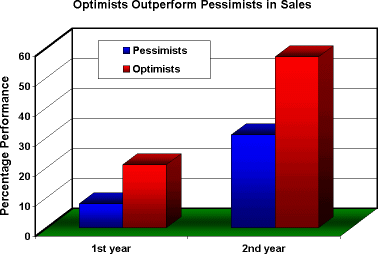Introduction
![]() Benefits
Benefits
![]() Applications
Applications
![]() Key points
Key points
![]() Theory
Theory
![]() Research findings
Research findings
![]()
Identifying High Achievers with the SASQ assessment questionnaire
Are you investing too much time and money hiring people who fall short of their potential and do not yield a positive return on your investment? Why is it that those with the most talent are not always the most successful?
The ability to overcome adversity is critical to success in most positions, especially sales. Your company's success depends on hiring the right people for the job.
Identify tomorrow's achievers today with the Seligman Attributional Style Questionnaire (SASQ), a measure of optimism and resilience under adversity. The SASQ is the result of over 30 years of research by Professor Martin Seligman, a leading expert on the psychology of motivation and author of the international best-selling book, Learned Optimism.
Benefits of the SASQ  Top
Top
Using the SASQ for selection and development will:
![]() Increase
productivity
Increase
productivity
![]() Reduce
turnover
Reduce
turnover
![]() Identify
more top producers to help your company grow
Identify
more top producers to help your company grow
![]() Create
a more optimistic and resilient work force
Create
a more optimistic and resilient work force
Applications of the SASQ  Top
Top
Selection
The SASQ can help you select the right people for sales and other positions that require persistence to overcome adversity. It is the nature of sales that even the best salesperson will fail far more often than succeed and this leads to turnover and burnout rates that are high and costly. The ability to bounce back from frequent setback is the exception rather than the rule. The SASQ can help you identify those with the resilience needed for challenging positions, like sales, call centres and management, before you make a large investment in training and support.
Research shows that a successful salesperson requires a higher level of optimism than an elite athlete.
Training and Development
The SASQ identifies optimism - the most important factor for overall success in life and work. The SASQ results give valuable information on where development can be targeted to improve optimism, resilience and results.
The SASQ is:  Top
Top
Valid
The SASQ predicts sales productivity in many industries - telecommunications, financial services, office products, automative, banking, and real estate, to name a few. Optimistic salespeople in these industries outsell the pessimists by 20% to 40%. Hundreds of studies have proven the benefits of optimism in many areas of life - increased motivation, superior achievement in various settings (at work, in school and in sports), elevated mood and well being, and better physical health.
Cost Effective
The cost of the SASQ is repaid many times over by the increased productivity of those selected and by the savings from not investing in poor producers. If the SASQ helps you select even one top producer that you would have overlooked, or eliminate one poor producer that you would have hired, this could cover your entire cost of using the SASQ.
Easy to Administer
The SASQ can be easily administered by any responsible person in your organization and takes about 20 minutes to complete. We provide the SASQ on user-friendly software and the test-taker can answer the SASQ questions on any Windows compatible computer. Upon completion, the SASQ score is instantly calculated. There is also a paper and pencil version of the questionnaire.
Legal
The SASQ complies with the Equal Employment Opportunity Commission guidelines. The SASQ has job-related predictive validity for sales positions and has no adverse impact. That is, the SASQ does not discriminate by gender, race or age and it is in compliance with the Americans with Disabilities Act (ADA) guidelines on employment testing.
The Theory Behind the SASQ  Top
Top
Research on the SASQ scientifically proves the common sense wisdom that optmistic beliefs can be self-fulfilling prophecies. The SASQ measures optimism by asking test-takers to answer a series of questions about their expectations for success and failure. Success begins with how we manage our reactions to adversity. Is adversity percieved as unrelenting or short-lived? Are setbacks viewed as overwhelming disasters or as manageable hurdles that can be overcome? Is adversity seen as a challenge to be confronted as an insurmountable obstacle to be avioded?
Optimists believe that adversity is short-lived and manageable, so they will typically take the actions necessary to overcome obstacles on the road to success. Failure is seen as a stepping stone to success. Consequently, optimists are more likely than pessimists to be self-motivated, resourceful, assertive and decisive in challenging situations. Optimists are also more likely to rebound quickly following defeats.
The SASQ increases the return on your investment in recruiting, selection, training, compensation and management support. It identifies the right people before you make a substantial investment of time and money.
Research findings supporting the SASQ  Top
Top
 |
Research shows high optimists outsell low pessimists by 37% |
![]()
